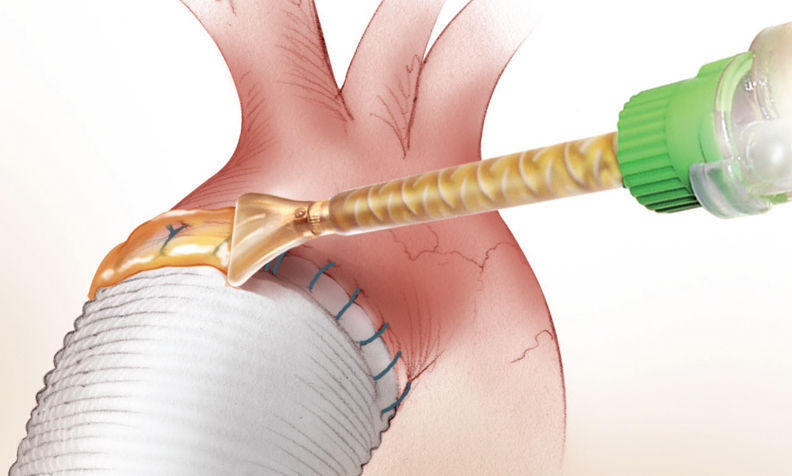Biological Glue Can Staunch A Cut In Just A Few Seconds
Ravi Singh - May 31, 2019

Chinese researchers have been working on something called "bioglue" which can stop wounds from bleeding in just a few seconds.
- Japan Hydrogen Breakthrough: Scientists Crack the Clean Energy Code with Mind-Blowing 1,000% Efficiency Jump
- 'Five-second rule' For Food Dropped On The Floor: Is It True?
- Scientists Want To Send 6.7 Million Samples, Including Sperm, To The Moon
A new "biological glue" has been proven to stop high-pressure bleeding in pig hearts.
When someone gets a serious injury, the wound itself might not always be the only concern. In fact, according to the National Institutes of Health (NIH), uncontrolled post-traumatic hemorrhage is the leading cause of potentially preventable death among injured patients.

For the above reason, a team of researchers from Zhejiang University School of Medicine in China has been trying to find out a solution. Currently, they are working on something called a "biological glue". The team believe that this “miracle” glue will one day be able to prevent hearts and arteries from uncontrollable bleeding.
According to the mentioned researchers, all the current materials used for bleeding prevention, which are medically known as hemostatic agents, face a common problem. They can barely control bleeding from cardiac wounds and traumatic arterial due to their weak adhesion to mobile and wet tissues.
Instead of attempting to recreate the typical band-aid, researchers decide to resemble something known as the extracellular matrix (ECM). Every animal is made out of cells. Most of them have ECMs, or places within their body in which carbohydrates mix with collagen protein to form a complex 3D mesh. In addition, the building blocks of the body's connective tissues, collagen, can be found within the ECMs. Your muscles, your joints, and even your teeth are all relying on the ECMs to keep things in place.
By mimicking the working mechanism of the ECMs, the bioglue can stick to the internal tissue. Although this invention hasn't been tested on humans yet, it has done substantially well in testing on pig hearts, which share a lot of similarities with human hearts.
The scientists say:

Featured Stories

Features - Jan 29, 2026
Permanently Deleting Your Instagram Account: A Complete Step-by-Step Tutorial

Features - Jul 01, 2025
What Are The Fastest Passenger Vehicles Ever Created?

Features - Jun 25, 2025
Japan Hydrogen Breakthrough: Scientists Crack the Clean Energy Code with...

ICT News - Jun 25, 2025
AI Intimidation Tactics: CEOs Turn Flawed Technology Into Employee Fear Machine

Review - Jun 25, 2025
Windows 11 Problems: Is Microsoft's "Best" OS Actually Getting Worse?

Features - Jun 22, 2025
Telegram Founder Pavel Durov Plans to Split $14 Billion Fortune Among 106 Children

ICT News - Jun 22, 2025
Neuralink Telepathy Chip Enables Quadriplegic Rob Greiner to Control Games with...

Features - Jun 21, 2025
This Over $100 Bottle Has Nothing But Fresh Air Inside

Features - Jun 18, 2025
Best Mobile VPN Apps for Gaming 2025: Complete Guide

Features - Jun 18, 2025
A Math Formula Tells Us How Long Everything Will Live
Read more

ICT News- Feb 19, 2026
Escalating Costs for NVIDIA RTX 50 Series GPUs: RTX 5090 Tops $5,000, RTX 5060 Ti Closes in on RTX 5070 Pricing
As the RTX 50 series continues to push boundaries in gaming and AI, these price trends raise questions about accessibility for average gamers.

Mobile- Feb 17, 2026
Anticipating the Samsung Galaxy S26 and S26+: Key Rumors and Specs
The Samsung Galaxy S26 series is on the horizon, sparking excitement among tech enthusiasts.

ICT News- Feb 18, 2026
Google's Project Toscana: Elevating Pixel Face Unlock to Rival Apple's Face ID
As the smartphone landscape evolves, Google's push toward superior face unlock technology underscores its ambition to close the gap with Apple in user security and convenience.
Comments
Sort by Newest | Popular